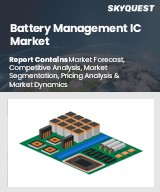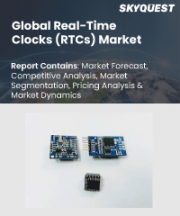
|
시장보고서
상품코드
1636753
RF 프론트엔드 집적회로 시장 예측(-2030년) : 구성요소별, 재료별, 통합 레벨별, 주파수대별, 용도별, 최종사용자별, 지역별 세계 분석RF Front End Integrated Circuits Market Forecasts to 2030 - Global Analysis by Component, Material, Integration Level, Frequency Range, Application, End User and By Geography |
||||||
Stratistics MRC에 따르면, RF 프론트엔드 집적회로 세계 시장은 2024년 246억 달러로 예측 기간 동안 11.3%의 CAGR로 성장하여 2030년에는 469억 달러에 달할 것으로 예상됩니다.
RF 프론트엔드 집적회로(RF 프론트엔드 IC)는 무선 통신 시스템에서 중요한 부품으로, 안테나와 송수신기 사이의 무선 주파수 신호 처리를 담당합니다. 증폭기, 필터, 믹서, 스위치 등의 주요 소자가 포함되어 신호 증폭, 주파수 변환, 필터 처리를 수행합니다. 이들 IC는 신호 무결성을 최적화하고, 노이즈를 줄이며, 전체 시스템 성능을 향상시키도록 설계되어 있습니다. 스마트폰, IoT 기기, 통신 인프라에 일반적으로 사용되는 RF 프론트엔드 IC는 다양한 주파수 대역에서 신호를 효율적으로 송수신할 수 있도록 하며, 컴팩트한 통합 설계로 4G, 5G, Wi-Fi, 블루투스 등의 기술을 지원합니다.
무선 연결에 대한 수요 증가
무선 연결에 대한 수요 증가는 RF 프론트엔드 집적회로(RFIC) 시장을 크게 견인하고 있으며, IoT 기기, 5G 네트워크, 스마트 기술의 확산으로 인해 효율적인 신호 송수신을 가능하게 하는 첨단 RFIC가 요구되고 있습니다. 이러한 회로는 디바이스의 성능을 향상시키고, 전력 소비를 줄이며, 원활한 연결성을 보장하는 데 중요한 역할을 합니다. 통신, 자동차, 가전 등의 산업에서 무선 솔루션의 채택이 증가함에 따라 고성능 RFIC에 대한 수요가 급증하여 세계 시장 성장을 견인할 것으로 예상됩니다.
높은 설계 및 제조 비용
RF 프론트엔드 집적회로(RFIC)의 설계 및 제조 비용이 높고, 특히 중소기업의 경우 정교한 기술에 대한 접근이 제한되어 시장 성장을 저해하고 있습니다. 제조 비용은 RFIC 설계의 복잡성, 전문 재료의 필요성, 정밀한 제조로 인해 상승합니다. 그 결과, 비용이 높은 지역과 기업에서 채택이 지연될 수 있습니다. 또한, 신흥 분야에서는 높은 비용이 기술 혁신을 방해하고 RFIC 시스템의 확장성을 제한할 수 있습니다.
5G 네트워크 확장
RFIC는 효과적인 신호 처리를 가능하게 하고, 전력 소비를 낮추며, 더 높은 주파수 대역과 넓은 대역폭을 요구하는 5G의 연결성을 개선하기 위해 필수적이며, RFIC 기술의 개발은 스마트폰, 기지국, 사물인터넷 장비 등 5G 인프라의 확산으로 인해 더욱 가속화되고 있습니다. 인터넷 기기를 포함한 5G 인프라의 보급으로 인해 RFIC 기술의 개발이 촉진되고 있습니다. 이러한 추세는 차세대 무선 통신 시스템의 증가하는 성능 요구를 충족시키기 위해 설계 및 제조 혁신을 가속화하고 있습니다.
열과 전력의 제약
열과 전력 제약은 RF 프론트엔드 집적회로(RFIC) 산업에 큰 영향을 미쳐 부품의 성능과 효율을 떨어뜨리고, RFIC가 고주파수에서 작동할 경우 열 방출을 제어하기가 더 어려워져 신뢰성 문제를 야기할 수 있습니다. 또한, 고성능 RFIC의 설계 및 집적은 스마트폰 및 사물인터넷 시스템과 같은 소형 기기의 전력 소비 문제로 인해 제한되어 확장성 및 광범위한 수용성에 영향을 미치고 있습니다.
COVID-19의 영향:
COVID-19 팬데믹으로 인해 RF 프론트엔드 집적회로 시장은 공급망 문제, 공장 가동 중단, 자동차 및 소비자 가전 분야에서의 수요 감소로 인해 혼란을 겪었습니다. 그러나 디지털 통신, 원격 근무, 5G 배포에 대한 의존도가 높아지면서 일부 손실이 상쇄되었습니다. 팬데믹 이후 복구 노력과 무선 인프라에 대한 투자 가속화로 시장 성장이 촉진되고 있으며, 전 세계적으로 연결성과 디지털 혁신을 가능하게 하는 RFIC의 중요한 역할이 부각되고 있습니다.
예측 기간 동안 헬스케어 분야가 가장 클 것으로 예상
웨어러블 기술, 원격의료 솔루션, 의료기기는 모두 무선 연결이 필요하기 때문에 헬스케어 분야는 예측 기간 동안 가장 큰 시장으로 성장할 것으로 예상됩니다. 실시간 건강 데이터 전송, 진단, 원격 환자 모니터링을 위한 신뢰할 수 있는 연결성은 첨단 RFIC를 통해 가능해집니다. 이러한 요구는 헬스케어 분야에서 IoT의 성장과 5G 기술의 도입으로 더욱 증가하고 있으며, 원활한 운영을 위해서는 저지연 및 고주파 RFIC에 의존하고 있습니다. 이러한 개발은 업무 효율성과 환자 치료를 개선하고 RFIC 산업의 성장 궤도를 가속화할 것입니다.
예측 기간 동안 스마트폰 분야가 가장 높은 CAGR을 기록할 것으로 예상됩니다.
스마트폰 분야는 5G 및 Wi-Fi 6와 같은 고속 연결에 대한 수요 증가로 인해 네트워크 성능 향상을 위한 RFIC 업그레이드에 대한 요구가 증가함에 따라 예측 기간 동안 가장 높은 CAGR을 기록할 것으로 예상됩니다. 스마트폰의 MIMO, 캐리어 애그리게이션(Carrier Aggregation), 신호 무결성 강화와 같은 기능을 위해서는 소형의 에너지 효율적인 RFIC가 필요합니다. 또한, IoT 및 스마트 기기와 모바일 플랫폼의 통합으로 인한 RFIC 애플리케이션의 확장은 이 시장 부문의 기술 혁신과 확장을 촉진하고 있습니다.
최대 점유율 지역
북미는 5G 네트워크의 광범위한 보급과 헬스케어, 자동차, 스마트 시티 등의 산업에서 IoT 디바이스의 통합이 증가함에 따라 예측 기간 동안 가장 큰 시장 점유율을 차지할 것으로 예상됩니다. 이 지역의 첨단 반도체 인프라와 R&D에 대한 강한 집중은 RFIC 기술 혁신을 촉진할 것입니다. 또한, 항공우주, 국방, 통신 분야에 대한 투자 확대는 고성능 RF 솔루션에 대한 수요를 증가시켜 북미가 세계 RFIC 시장에서 중요한 위치를 차지하고 있습니다.
CAGR이 가장 높은 지역:
아시아태평양은 스마트폰의 보급과 사물인터넷(Internet of Things) 앱의 개선으로 인해 예측 기간 동안 가장 높은 CAGR을 기록할 것으로 예상됩니다. 특히 중국, 한국, 대만과 같은 국가에서는 소비자 전자제품 부문이 호황을 누리고 있으며, 반도체 제조 기반이 탄탄한 점도 성장을 견인하고 있습니다. 또한, 차량용 커넥티비티 솔루션과 국방비 투자 증가로 인해 시장도 확대되고 있습니다. 이 지역의 RFIC 개발 경쟁력은 R&D와 기술 혁신을 촉진하는 정부 정책으로 인해 더욱 강화되고 있습니다.
무료 커스터마이징 서비스:
본 보고서를 구독하는 고객은 다음과 같은 무료 맞춤화 옵션 중 하나를 이용할 수 있습니다:
- 기업 개요
- 추가 시장 기업의 종합적인 프로파일링(최대 3개사까지)
- 주요 기업 SWOT 분석(3개사까지)
- 지역 세분화
- 고객의 관심에 따른 주요 국가별 시장 추정치, 예측, CAGR(주: 타당성 검토에 따른)
- 경쟁사 벤치마킹
- 제품 포트폴리오, 지리적 입지, 전략적 제휴를 기반으로 한 주요 기업 벤치마킹
목차
제1장 주요 요약
제2장 서문
- 개요
- 이해관계자
- 조사 범위
- 조사 방법
- 데이터 마이닝
- 데이터 분석
- 데이터 검증
- 조사 접근법
- 조사 정보 출처
- 1차 조사 정보 출처
- 2차 조사 정보 출처
- 가정
제3장 시장 동향 분석
- 성장 촉진요인
- 성장 억제요인
- 기회
- 위협
- 용도 분석
- 최종사용자 분석
- 신흥 시장
- COVID-19의 영향
제4장 Porter's Five Forces 분석
- 공급 기업의 교섭력
- 구매자의 교섭력
- 대체품의 위협
- 신규 참여업체의 위협
- 경쟁 기업 간의 경쟁 관계
제5장 세계의 RF 프론트엔드 집적회로 시장 : 구성요소별
- 파워 앰프
- 저잡음 증폭기(LNA)
- RF 스위치
- 필터
- 듀플렉서
- 안테나
- 기타 구성요소
제6장 세계의 RF 프론트엔드 집적회로 시장 : 재료별
- 실리콘
- 갈륨비소(GaAs)
- 질화갈륨(GaN)
- 실리콘 게르마늄(SiGe)
- 기타 자료
제7장 세계의 RF 프론트엔드 집적회로 시장 : 통합 레벨별
- 디스크리트 RF 컴포넌트
- 통합 RF 프론트엔드
- RF 시스템온칩(SoC)
제8장 세계의 RF 프론트엔드 집적회로 시장 : 주파수대별
- 저주파(1 GHz 미만)
- 중주파(1 GHz-6 GHz)
- 고주파(6 GHz 이상)
제9장 세계의 RF 프론트엔드 집적회로 시장 : 용도별
- 스마트폰
- 인포테인먼트 시스템
- 기지국
- 원격 감시 장비
- 기타 용도
제10장 세계의 RF 프론트엔드 집적회로 시장 : 최종사용자별
- 통신
- 자동차·운송
- 산업
- 군·방위
- 헬스케어
- 가전
- 기타 최종사용자
제11장 세계의 RF 프론트엔드 집적회로 시장 : 지역별
- 북미
- 미국
- 캐나다
- 멕시코
- 유럽
- 독일
- 영국
- 이탈리아
- 프랑스
- 스페인
- 기타 유럽
- 아시아태평양
- 일본
- 중국
- 인도
- 호주
- 뉴질랜드
- 한국
- 기타 아시아태평양
- 남미
- 아르헨티나
- 브라질
- 칠레
- 기타 남미
- 중동 및 아프리카
- 사우디아라비아
- 아랍에미리트
- 카타르
- 남아프리카공화국
- 기타 중동 및 아프리카
제12장 주요 발전
- 계약, 파트너십, 협업, 합작투자
- 인수와 합병
- 신제품 발매
- 사업 확대
- 기타 주요 전략
제13장 기업 개요
- Broadcom Inc.
- Skyworks Solutions Inc.
- Murata Manufacturing Co. Ltd.
- Qorvo Inc.
- NXP Semiconductors NV
- Texas Instruments Incorporated
- Infineon Technologies AG
- Qualcomm Technologies Inc.
- Analog Devices Inc.
- STMicroelectronics
- MediaTek Inc.
- Samsung Electronics Co., Ltd.
- ON Semiconductor
- MaxLinear, Inc.
- Renesas Electronics Corporation
- Fujitsu Limited
- ROHM Co., Ltd.
- Toshiba Corporation
- Sony Corporation
- Silicon Laboratories Inc.
According to Stratistics MRC, the Global RF Front End Integrated Circuits Market is accounted for $24.6 billion in 2024 and is expected to reach $46.9 billion by 2030 growing at a CAGR of 11.3% during the forecast period. RF Front End Integrated Circuits (RF Front End ICs) are critical components in wireless communication systems, responsible for processing radio frequency signals between the antenna and the transceiver. They include key elements such as amplifiers, filters, mixers, and switches, which handle signal amplification, frequency conversion, and filtering. These ICs are designed to optimize signal integrity, reduce noise, and enhance overall system performance. Commonly used in smartphones, IoT devices, and communication infrastructure, RF Front End ICs enable efficient transmission and reception of signals in various frequency bands, supporting technologies like 4G, 5G, Wi-Fi, and Bluetooth in compact and integrated designs.
Market Dynamics:
Driver:
Rising Demand for Wireless Connectivity
The rising demand for wireless connectivity is significantly driving the RF Front End Integrated Circuits (RFIC) market. The proliferation of IoT devices, 5G networks, and smart technologies necessitates advanced RFICs to enable efficient signal transmission and reception. These circuits play a crucial role in enhancing device performance, reducing power consumption, and ensuring seamless connectivity. As industries like telecommunications, automotive, and consumer electronics increasingly adopt wireless solutions, the demand for high-performance RFICs is poised to surge, fueling market growth globally.
Restraint:
High Design and Manufacturing Costs
High design and manufacturing costs for RF Front End Integrated Circuits (RFICs) stifle market growth by limiting access to sophisticated technology, particularly among smaller firms. Production costs are raised by the intricacy of RFIC design, the requirement for specialist materials, and precise manufacturing. Adoption in areas and businesses with high costs may be delayed as a result. Furthermore, in emerging areas, the high costs may hinder innovation and restrict the scalability of RFIC systems.
Opportunity:
Expansion of 5G Networks
The deployment of 5G networks is propelling considerable growth in the industry. RFICs are crucial for allowing effective signal processing, lowering power consumption, and improving connectivity in light of 5G's requirement for higher frequency bands and broader bandwidths. Developments in RFIC technologies are being fueled by the spread of 5G infrastructure, which includes smartphones, base stations, and Internet of Things devices. In order to fulfill the increasing performance needs of next-generation wireless communication systems, this trend is speeding up design and manufacturing innovation.
Threat:
Thermal and Power Constraints
Thermal and power restrictions have a substantial impact on the RF Front End Integrated Circuits (RFIC) industry, reducing component performance and efficiency. Controlling heat dissipation gets more difficult when RFICs run at higher frequencies, which might cause reliability problems. Furthermore, the design and integration of high-performance RFICs are limited by power consumption issues in tiny devices, such as smartphones and Internet of Things systems, which affect their scalability and broad acceptance.
Covid-19 Impact:
The COVID-19 pandemic disrupted the RF Front End Integrated Circuits market due to supply chain challenges, factory shutdowns, and reduced demand in sectors like automotive and consumer electronics. However, increased reliance on digital communication, remote work, and 5G deployments offset some losses. Recovery efforts and accelerated investments in wireless infrastructure post-pandemic have since boosted market growth, highlighting the critical role of RFICs in enabling connectivity and digital transformation globally.
The healthcare segment is expected to be the largest during the forecast period
The healthcare segment is expected to be the largest during the forecast period because wearable technology, telemedicine solutions, and medical gadgets all require wireless connection. Reliable connectivity for real-time health data transfer, diagnostics, and remote patient monitoring is made possible by advanced RFICs. This need is further increased by the growth of IoT in healthcare and the deployment of 5G technology, as smooth operation depends on low-latency, high-frequency RFICs. These developments improve operational effectiveness and patient care, which accelerates the growth trajectory of the RFIC industry.
The smartphones segment is expected to have the highest CAGR during the forecast period
The smartphones segment is expected to have the highest CAGR during the forecast period owing to Rising demand for high-speed connection, such as 5G and Wi-Fi 6, has increased the requirement for upgraded RFICs to provide improved network performance. Compact, energy-efficient RFICs are necessary for smartphone features like MIMO, carrier aggregation, and enhanced signal integrity. Further propelling innovation and expansion in this market segment is the expansion of RFIC applications brought about by the integration of IoT and smart devices with mobile platforms.
Region with largest share:
North America is anticipated to hold the largest market share during the forecast period due to widespread deployment of 5G networks and the increasing integration of IoT devices in industries like healthcare, automotive, and smart cities. The region's advanced semiconductor infrastructure and strong focus on R&D foster innovation in RFIC technology. Furthermore, growing investments in aerospace, defense, and telecommunications amplify demand for high-performance RF solutions, establishing North America as a critical player in the global RFIC market.
Region with highest CAGR:
Asia Pacific is anticipated to witness the highest CAGR over the forecast period due to growing smartphone usage and improvements in Internet of Things apps. Growth is also fueled by the region's booming consumer electronics sector and strong semiconductor manufacturing base, especially in nations like China, South Korea, and Taiwan. The market is also growing as a result of increased investments in automotive connection solutions and defense spending. The region's competitive edge in RFIC development is strengthened by government measures to promote R&D and technical innovation.
Key players in the market
Some of the key players in RF Front End Integrated Circuits market include Broadcom Inc., Skyworks Solutions Inc., Murata Manufacturing Co. Ltd., Qorvo Inc., NXP Semiconductors NV, Texas Instruments Incorporated, Infineon Technologies AG, Qualcomm Technologies Inc., Analog Devices Inc., STMicroelectronics, MediaTek Inc., Samsung Electronics Co., Ltd., ON Semiconductor, MaxLinear, Inc., Renesas Electronics Corporation, Fujitsu Limited, ROHM Co., Ltd., Toshiba Corporation, Sony Corporation and Silicon Laboratories Inc.
Key Developments:
In December 2024, World Aquatics and Sony Corporation announced an unprecedented Official Partnership for the four years to 2028, which will transform the way aquatics fans engage with and consume aquatic sports.
In October 2024, Sony Corporation announced that Sony welcomed KinaTrax, Inc., a leader in research-grade markerless motion capture technology for sports that collects in-game biomechanical performance data on athletes, into Sony's sports businesses through a recent acquisition.
In September 2024, Cellares and Sony announced a joint development collaboration to integrate flow cytometry-based sorting and online analysis into an automated, high-throughput cell therapy manufacturing platform.
Components Covered:
- Power Amplifiers
- Low Noise Amplifiers (LNAs)
- RF Switches
- Filters
- Duplexers
- Antennas
- Other Components
Materials Covered:
- Silicon
- Gallium Arsenide (GaAs)
- Gallium Nitride (GaN)
- Silicon Germanium (SiGe)
- Other Materials
Integration Levels Covered:
- Discrete RF Components
- Integrated RF Front Ends
- RF System-on-Chip (SoC)
Frequency Ranges Covered:
- Low Frequency (Sub-1 GHz)
- Mid-Frequency (1 GHz-6 GHz)
- High Frequency (Above 6 GHz)
Applications Covered:
- Smartphones
- Infotainment Systems
- Base Stations
- Remote Monitoring Devices
- Other Applications
End Users Covered:
- Telecommunications
- Automotive and Transportation
- Industrial
- Military and Defense
- Healthcare
- Consumer Electronics
- Other End Users
Regions Covered:
- North America
- US
- Canada
- Mexico
- Europe
- Germany
- UK
- Italy
- France
- Spain
- Rest of Europe
- Asia Pacific
- Japan
- China
- India
- Australia
- New Zealand
- South Korea
- Rest of Asia Pacific
- South America
- Argentina
- Brazil
- Chile
- Rest of South America
- Middle East & Africa
- Saudi Arabia
- UAE
- Qatar
- South Africa
- Rest of Middle East & Africa
What our report offers:
- Market share assessments for the regional and country-level segments
- Strategic recommendations for the new entrants
- Covers Market data for the years 2022, 2023, 2024, 2026, and 2030
- Market Trends (Drivers, Constraints, Opportunities, Threats, Challenges, Investment Opportunities, and recommendations)
- Strategic recommendations in key business segments based on the market estimations
- Competitive landscaping mapping the key common trends
- Company profiling with detailed strategies, financials, and recent developments
- Supply chain trends mapping the latest technological advancements
Free Customization Offerings:
All the customers of this report will be entitled to receive one of the following free customization options:
- Company Profiling
- Comprehensive profiling of additional market players (up to 3)
- SWOT Analysis of key players (up to 3)
- Regional Segmentation
- Market estimations, Forecasts and CAGR of any prominent country as per the client's interest (Note: Depends on feasibility check)
- Competitive Benchmarking
- Benchmarking of key players based on product portfolio, geographical presence, and strategic alliances
Table of Contents
1 Executive Summary
2 Preface
- 2.1 Abstract
- 2.2 Stake Holders
- 2.3 Research Scope
- 2.4 Research Methodology
- 2.4.1 Data Mining
- 2.4.2 Data Analysis
- 2.4.3 Data Validation
- 2.4.4 Research Approach
- 2.5 Research Sources
- 2.5.1 Primary Research Sources
- 2.5.2 Secondary Research Sources
- 2.5.3 Assumptions
3 Market Trend Analysis
- 3.1 Introduction
- 3.2 Drivers
- 3.3 Restraints
- 3.4 Opportunities
- 3.5 Threats
- 3.6 Application Analysis
- 3.7 End User Analysis
- 3.8 Emerging Markets
- 3.9 Impact of Covid-19
4 Porters Five Force Analysis
- 4.1 Bargaining power of suppliers
- 4.2 Bargaining power of buyers
- 4.3 Threat of substitutes
- 4.4 Threat of new entrants
- 4.5 Competitive rivalry
5 Global RF Front End Integrated Circuits Market, By Component
- 5.1 Introduction
- 5.2 Power Amplifiers
- 5.3 Low Noise Amplifiers (LNAs)
- 5.4 RF Switches
- 5.5 Filters
- 5.6 Duplexers
- 5.7 Antennas
- 5.8 Other Components
6 Global RF Front End Integrated Circuits Market, By Material
- 6.1 Introduction
- 6.2 Silicon
- 6.3 Gallium Arsenide (GaAs)
- 6.4 Gallium Nitride (GaN)
- 6.5 Silicon Germanium (SiGe)
- 6.6 Other Materials
7 Global RF Front End Integrated Circuits Market, By Integration Level
- 7.1 Introduction
- 7.2 Discrete RF Components
- 7.3 Integrated RF Front Ends
- 7.4 RF System-on-Chip (SoC)
8 Global RF Front End Integrated Circuits Market, By Frequency Range
- 8.1 Introduction
- 8.2 Low Frequency (Sub-1 GHz)
- 8.3 Mid-Frequency (1 GHz-6 GHz)
- 8.4 High Frequency (Above 6 GHz)
9 Global RF Front End Integrated Circuits Market, By Application
- 9.1 Introduction
- 9.2 Smartphones
- 9.3 Infotainment Systems
- 9.4 Base Stations
- 9.5 Remote Monitoring Devices
- 9.6 Other Applications
10 Global RF Front End Integrated Circuits Market, By End User
- 10.1 Introduction
- 10.2 Telecommunications
- 10.3 Automotive and Transportation
- 10.4 Industrial
- 10.5 Military and Defense
- 10.6 Healthcare
- 10.7 Consumer Electronics
- 10.8 Other End Users
11 Global RF Front End Integrated Circuits Market, By Geography
- 11.1 Introduction
- 11.2 North America
- 11.2.1 US
- 11.2.2 Canada
- 11.2.3 Mexico
- 11.3 Europe
- 11.3.1 Germany
- 11.3.2 UK
- 11.3.3 Italy
- 11.3.4 France
- 11.3.5 Spain
- 11.3.6 Rest of Europe
- 11.4 Asia Pacific
- 11.4.1 Japan
- 11.4.2 China
- 11.4.3 India
- 11.4.4 Australia
- 11.4.5 New Zealand
- 11.4.6 South Korea
- 11.4.7 Rest of Asia Pacific
- 11.5 South America
- 11.5.1 Argentina
- 11.5.2 Brazil
- 11.5.3 Chile
- 11.5.4 Rest of South America
- 11.6 Middle East & Africa
- 11.6.1 Saudi Arabia
- 11.6.2 UAE
- 11.6.3 Qatar
- 11.6.4 South Africa
- 11.6.5 Rest of Middle East & Africa
12 Key Developments
- 12.1 Agreements, Partnerships, Collaborations and Joint Ventures
- 12.2 Acquisitions & Mergers
- 12.3 New Product Launch
- 12.4 Expansions
- 12.5 Other Key Strategies
13 Company Profiling
- 13.1 Broadcom Inc.
- 13.2 Skyworks Solutions Inc.
- 13.3 Murata Manufacturing Co. Ltd.
- 13.4 Qorvo Inc.
- 13.5 NXP Semiconductors NV
- 13.6 Texas Instruments Incorporated
- 13.7 Infineon Technologies AG
- 13.8 Qualcomm Technologies Inc.
- 13.9 Analog Devices Inc.
- 13.10 STMicroelectronics
- 13.11 MediaTek Inc.
- 13.12 Samsung Electronics Co., Ltd.
- 13.13 ON Semiconductor
- 13.14 MaxLinear, Inc.
- 13.15 Renesas Electronics Corporation
- 13.16 Fujitsu Limited
- 13.17 ROHM Co., Ltd.
- 13.18 Toshiba Corporation
- 13.19 Sony Corporation
- 13.20 Silicon Laboratories Inc.



















